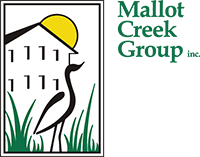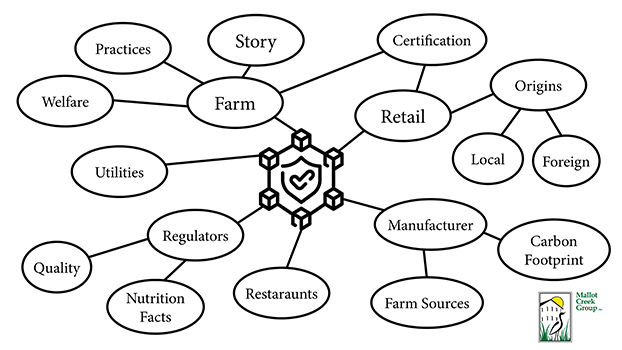5 Ways Blockchain Decentralization will Improve Agri-Food
As the world becomes more connected through the Internet of Things (IoT), a significant gap has formed in how data is managed, verified, and stored. Poised to fill this gap is the adoption of blockchain technology.
Using a blockchain to hold data that otherwise would be held on a corporate database has a number of advantages. These advantages are not specific to one industry as all sectors generate massive amounts of information that is often shared with multiple parties such as regulating bodies or customers.
In this article we will go over 5 ways that a decentralized blockchain will revolutionize the food and agriculture sector.
Glossary
- Blockchain: A database or record of transactions linked together and verified using encrypted hashing.
- Decentralized: Multiple companies running the same database and confirming the authenticity of a public ledger.
- Public Ledger: A publicly available transaction list that shows each transaction as it occurs. Sensitive information can be hidden and only available to companies involved in the transaction.
Blockchain technology will allow the sharing and verification of data in a web like connection throughout the food industry.
Reason #1 – Full Supply Chain Transparency & Traceability
A Supply Chain can make or break a company and our supply chains are beginning to show their cracks with consecutive global disruptions over the past few years. Considering how global our society is in the 21st century we often forget that raw materials are typically sourced from foreign countries, be it our neighbour to the south or western Europe. Much of business is dealing with transactions and sourcing raw materials which could easily be tracked through a blockchain, preferably a decentralized one ensuring the blockchains integrity.
So how would a blockchain provide transparency or traceability? The short answer is a public ledger, but since few blockchains have been developed specific to the agriculture and food sector, there needs to be discussions about privacy to ensure the interests of all parties are met. This is a great opportunity to build a functional system from the ground up to meet the needs of all participants. Customers want to know where their food was sourced, governments want to ensure food safety and manufactures want to have a reliable supply chain. By using a blockchain, each party can see the information that they require allowing for better informed decisions at all levels.
Reason #2 – Blockchain’s Accurate Forecasting
With a fully integrated supply chain network on a decentralized blockchain, the vast amount of data that could be captured is only limited to the developer’s imagination and privacy laws. With all this data, analysts would be able to accurately forecast consumer demand of products. By looking at retail demand, manufactures would see how well a new product was received or if another product’s demand is decreasing.
Blockchains can be deployed for any business, be it a wheat farmer or a grocery store. Each business uses different key performance indicators (and sensors) to ensure their operations are running well. The information captured by sensors can be stored on a blockchain which would ensure that the information can not be changed later. If you are looking for more information discussing future uses of AI, blockchain and IoT in food manufacturing and farming, Microsoft FarmBeats is a great resource.
Looking for an example of blockchain technology implemented in the Agri-food industry?
Check out IBM’s “Food Trust” food chain intelligence suite: https://www.ibm.com/topics/what-is-blockchain
Reason #3 – Immutable Certifications
Organic, Non-GMO, Fair Trade, Gluten free, and sustainably sourced product claims are currently on the mind of many consumers. These consumers are looking to purchase items that align with their beliefs while meeting their dietary needs. These certifications are a way for producers to prove that their product meets a set of criteria, allowing them to use the claim on their product, and often allows manufacturers to charge a premium price for these products. Currently, consumers need to trust that the governing body overseeing these accreditations has certified that manufacturers are meeting the credential’s criteria but there is nothing to authenticate this assessment past a certification logo on the product’s label.
While it isn’t wholly necessary to store this information on a blockchain, it would provide the consumer with the option to investigate the manufactures claims for themselves, allowing for a more informed purchase. These certifications would automatically be updated should a manufacturer fall outside of compliance and lead to higher levels of trust from farm to fork.
Reason #4 – Blockchain Trust
Trust can be hard to come by nowadays but the beauty of a decentralized blockchain is that there is no need for trust, the computer handles verification for us. While a human will still be inputting much of the data housed on a blockchain, the person reviewing or verifying the authenticity of the data would need to be external to the manufacture. Similar to how the Canadian Food Inspection Agency (CFIA) works alongside Quality Assurance but doesn’t report to the company’s managers; the authenticator of critical data will report to the regulatory body, not the manufacturer. This will ensure that the data is authentic and once it is stored on the blockchain, it is impossible to change discretely.
While the system described above sounds no different than the status quo, the trust built into the blockchain starts after data entry. This inability to change the decentralized ledger is what puts a blockchain’s security far above standard databases. There is accountability built in and when using the blockchain to conduct orders and track inventory, there are high levels of trust since this data cannot be altered without clear indication that it has been. If a retailer orders a specific quantity of an item, the order would be logged in the ledger along with the shipping receipt. If the retailer received less than they ordered, a discrepancy would be found in the chain of transactions. This is where the trust in the system is built. There wouldn’t be need to argue the discrepancy as it would be found on the blockchain ledger, and the accountable party could be shown evidence, and asked to fix the discrepancy.
Reason #5 – Reduced Food Waste
With the vast data collected from farmers, manufactures, retailers and consumers, the agri-food industry would become much more efficient at meeting the needs of our population. The supply chain network would be significantly more efficient since manufactures would have all the information at their fingertips to make purchasing decisions based on forecasted demand and current inventory levels.
Food wastes could be tracked and diverted prior to landfill for other applications such as biodigesters. Retailers could keep better track of expiration dates and this could be pushed to consumers who purchased said items. Retailer wide recalls would be a thing of the past since all parties from farm to plate would know exactly which farm/manufacture the contamination came from and to which stores the product was delivered.

